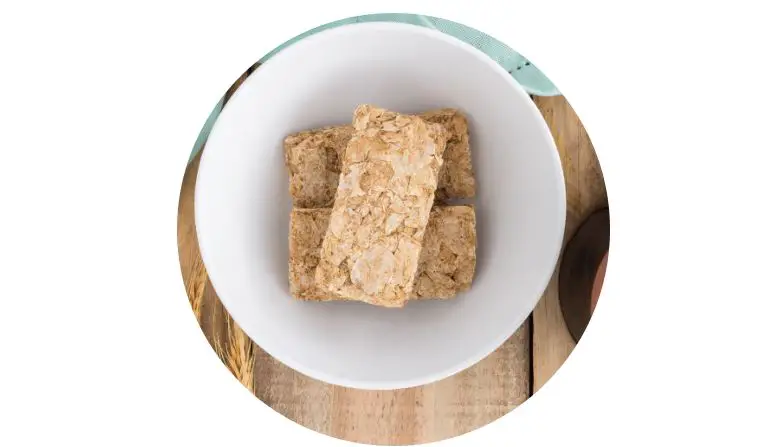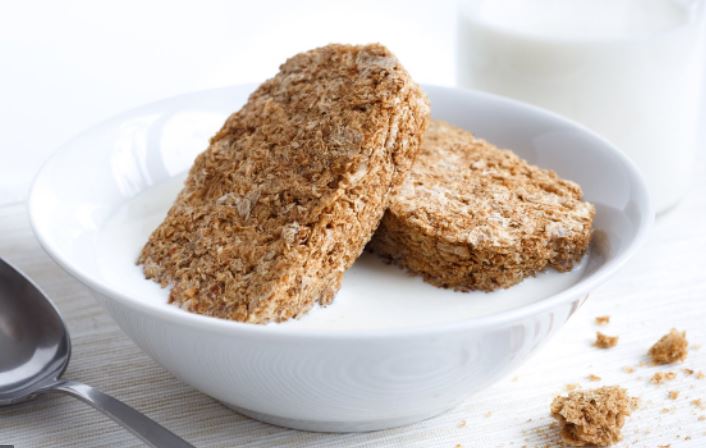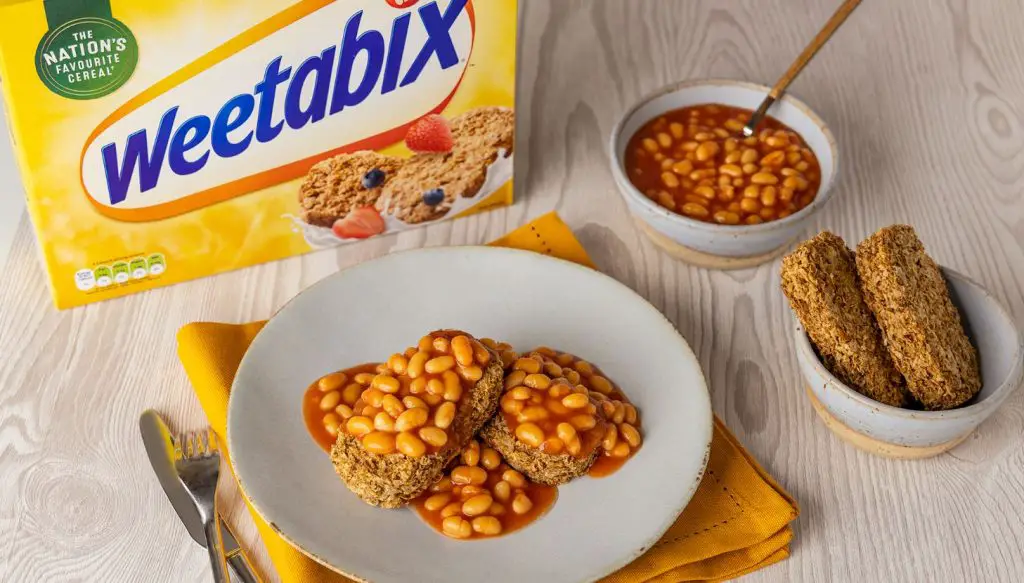
Answer: Yes, cats can eat Weetabix. It is a healthy and nutritious food for them but please ensure that the amount provided is moderate, as excessive consumption may lead to digestive problems.
Some cats may find enjoyment in consuming foods such as weetabix, and it is generally acceptable to offer them small portions occasionally as a treat.
Providing your cat with this cereal is considered safe as it possesses minimal quantities of sugar and salt. Weetabix offers a high fiber content and is low in fat, making it a suitable option for your feline companion.
Weetabix is rich in dietary fiber, which can greatly benefit a cat’s digestive system. The high fiber content aids in regulating bowel movements, preventing constipation, and promoting healthy digestion. It can also reduce the risk of hairballs, which can be a common issue in cats.
Weetabix is a popular breakfast cereal that is made from wheat. It is often eaten with milk or added to smoothies. Wheat is a cereal grain that is cultivated for its grain and can be used to make other foods.
| Note: Our team of veterinary experts has written a detailed article on What Kind of Milk Can Cats Drink? Check it. |
What are the Benefits of Weetabix for Cats?

There are many benefits to feeding cats Weetabix. For one, it is a high-quality protein that helps keep cats healthy and strong. Additionally, the fiber in Weetabix can help regulate digestion and prevent problems like constipation.
The B vitamins in Weetabix also support energy production and help keep cats’ coats looking shiny and healthy. Finally, since Weetabix is low in fat and calories, it can help overweight or obese cats lose weight gradually and safely. Cats can eat Weetabix or any other cereal, for that matter.
Weetabix contains essential nutrients, including vitamins and minerals, that contribute to a cat’s coat health. These nutrients help nourish the skin and promote the growth of a shiny, lustrous coat. It is a source of omega-3 fatty acids, which play a vital role in maintaining healthy skin and reducing inflammation.
Weetabix provides a source of complex carbohydrates and B vitamins, which are important for energy production. These nutrients can support an active lifestyle and help your cat stay energized throughout the day.
However, not all cereals are suitable for cats. This is because the type of fiber in each cereal varies. Some cereals highly processed or may have added flavors that could upset a cat’s stomach.
Therefore, when choosing a cereal for your cat, you should select one that contains only corn and wheat and is low in fat.
Is weetabix good for cats?
Whether or not Weetabix is good for cats depends on how it is fed to them. If given in moderation and mixed with some wet cat food, Weetabix can be a safe and nutritious treat or supplement for cats. However, it is important to note that Weetabix is not a complete and balanced diet for cats, and it should not be fed to them as a replacement for their regular cat food.
Here are some of the potential benefits and risks of feeding Weetabix to cats:
Benefits:
- Weetabix is a good source of fiber, which can help to keep cats’ digestive systems healthy.
- Weetabix also contains vitamins and minerals that are essential for cats’ health, such as vitamin B1, vitamin E, and iron.
- Weetabix can be a good way to add variety to a cat’s diet and to make their regular cat food more appealing.
Risks:
- Weetabix is high in carbohydrates and low in protein and fat, which are essential nutrients for cats.
- Feeding cats too much Weetabix can lead to weight gain and other health problems.
- Weetabix can contain added sugar and salt, which can be harmful to cats in excess.
- Mixing Weetabix with milk can cause diarrhea in cats.
Overall, Weetabix can be a safe and nutritious treat or supplement for cats if given in moderation and mixed with some wet cat food. However, it is important to note that Weetabix is not a complete and balanced diet for cats, and it should not be fed to them as a replacement for their regular cat food.
If you are considering giving your cat Weetabix, it is important to talk to your veterinarian first. They can help you to determine how much Weetabix is safe to give your cat and how to feed it to them safely.
Can Cats Eat Weetabix with Milk?
Cats are obligate carnivores, meaning their diet primarily consists of meat. While a small amount of weetabix with milk is unlikely to cause immediate harm, it is not a suitable or necessary part of a cat’s diet. Cats do not have a nutritional requirement for grains or dairy products like milk. Feeding weetabix with milk to cats regularly can lead to digestive issues, including diarrhea or upset stomach.
Can kittens have weetabix?
Yes, kittens can have Weetabix in moderation. It is not toxic to kittens, and it can provide them with some essential nutrients, such as fiber, vitamins, and minerals. However, it is important to note that Weetabix is not a complete and balanced diet for kittens. It is high in carbohydrates and low in protein and fat, which are essential nutrients for kittens.
If you do choose to give your kitten Weetabix, be sure to do so in moderation. Offer it as a treat or supplement, not as a replacement for their regular kitten food. You can also mix Weetabix with some wet kitten food to make it more appealing to your kitten and to help increase their protein intake.
Here are some tips for feeding your kitten Weetabix safely:
- Only give Weetabix to your kitten in moderation.
- Mix Weetabix with some wet kitten food to make it more appealing to your kitten and to help increase their protein intake.
- Avoid giving your kitten Weetabix with milk, as this can cause diarrhea.
- If your kitten has any health conditions, be sure to talk to your veterinarian before feeding them Weetabix.
Overall, Weetabix is a safe and nutritious food for kittens to eat in moderation. However, it is important to note that it is not a complete and balanced diet for kittens. If you do choose to give your kitten Weetabix, be sure to do so safely and in moderation.
How much Should You Feed Your Cat?

How much should you feed your cat? You should start by feeding your cat a minimum of 2.5ml (1 teaspoon) of dry food per day and gradually increase this to 3ml (1 teaspoon) per day over a period of several weeks.
Can Cats Eat Oatmeal with Milk?
Answer: It is not recommended to mix it with milk. Cats are obligate carnivores, which means that their bodies are designed to thrive on a diet of animal protein. While cats can eat small amounts of grains and carbohydrates, these should not be a significant part of their diet.
Oatmeal is a type of grain that can be a healthy addition to a cat’s diet in small amounts. However, it is important to note that cats do not require or digest plant-based foods as efficiently as they do animal-based proteins.
Milk is another food item that is not necessarily harmful to cats, but many cats are lactose intolerant, which means that they cannot properly digest the lactose found in milk. Consuming milk can cause digestive issues such as diarrhea, vomiting, and stomach upset in cats.
Therefore, while cats can eat oatmeal in small amounts as a treat or addition to their regular food. If you choose to feed your cat oatmeal, it should be cooked plain and served in moderation, without any added sugar, salt, or milk.
How Do You Make Oatmeal for Cats?
While oatmeal is not a necessary component of a cat’s diet, it can be given as an occasional treat. If you choose to offer oatmeal to your cat, it is important to prepare it in a way that is safe and healthy for them to consume.
Here’s a simple recipe to make oatmeal for cats:
Ingredients:
- 1/4 cup of rolled oats
- 1/2 cup of water or low-sodium chicken broth
Instructions:
- Combine the rolled oats and water or chicken broth in a small pot and bring it to a boil over medium-high heat.
- Reduce the heat to low and let the oats simmer for 5-7 minutes or until they have absorbed most of the liquid and have become soft and mushy.
- Remove the pot from the heat and let the oatmeal cool down to room temperature.
- Serve a small portion of the oatmeal to your cat in a shallow bowl or plate.
It is important to note that oatmeal should not replace your cat’s regular diet and should only be given as an occasional treat. Additionally, avoid adding any sweeteners, such as sugar or honey, to the oatmeal as these can be harmful to your cat.
What Human Food Can Cats Eat As a Treat?
As obligate carnivores, cats require a diet that is high in protein and low in carbohydrates. While there are many foods that humans can safely share with their feline friends, it is important to keep in mind that cats have unique dietary needs and should not be fed a diet consisting primarily of human food.
When it comes to treats, it’s best to stick to foods that are both safe and healthy for cats. Here are some human foods that cats can eat as an occasional treat:
- Cooked Meat: Cats can enjoy small amounts of cooked chicken, turkey, beef, or fish as a treat. Be sure to remove any bones and skin, and avoid seasoning the meat with any spices or herbs.
- Cooked Eggs: Cats can also eat cooked eggs, such as scrambled or boiled eggs. Make sure the eggs are fully cooked, as raw eggs can be harmful to cats.
- Canned Tuna: Cats can enjoy canned tuna in water as a treat, but it should not be a regular part of their diet as it lacks essential nutrients.
- Plain Yogurt: Plain, unsweetened yogurt can be a healthy treat for cats in small amounts, as it contains beneficial probiotics.
- Cooked Vegetables: Cats can eat certain cooked vegetables as a treat, such as green beans, peas, and carrots. However, it’s important to avoid feeding them onions, garlic, or other members of the allium family, as these can be toxic to cats.
- Fruits: Some cats may enjoy small amounts of fruits like sliced bananas or apples, but it’s important to note that cats are obligate carnivores and don’t require fruits in their diet.
It’s important to remember that treats should only make up a small portion of a cat’s diet, and should not exceed 10% of their daily caloric intake.

